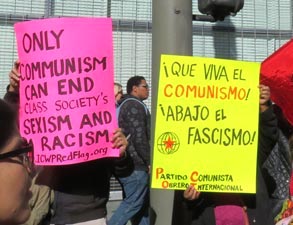
“Rights” and “Needs” in Communism
In the last Red Flag, Lily and Maisie were discussing “rights.” Maisie had insisted that women have the “right” to make their own decisions about health care, including having abortions or not. Lily had responded that talking about “rights” emphasizes individuals, fighting for and winning limited freedoms within an oppressive society.
“As communists,” Lily continued, “we fight for power for the working masses and an end to class oppression. We’ll build a society where we work together to meet our needs, rather than working to make bosses rich. We’ll be able to live in a new way, making decisions together about everything.”
“But there will still have to be a decision-making process, and an organizational structure,” responded Maisie. “Planning and organizing any system involves assessing how much effort we can ask from the folks involved. For instance, asking ‘What’s the value of a parent having time with their children, versus an artist having time for their art, versus kids having enough food?’
“Is it a real or a semantic difference to talk about ‘the rights of parents,’ ‘the right to self-expression’ or the ‘the right to food’?” Maisie wondered.
What’s the difference between “rights” and “needs”?
“It goes back to the question of who’s in charge,” answered Lily. “Everyone needs healthy food and human bonds (and kids need specific age-appropriate close human bonding and nurturing). Everyone needs to be able to contribute to society and to express their feelings and desires in creative and appropriate ways. Together we will build a society that recognizes those needs.
“Class society is based on exploitation, oppression, and division. To survive, every oppressed person must defend themself. Communist revolution will resolve that contradiction and set up a classless society.
“The contradiction between the individual and society will be transformed. Everyone, of course, will still be both an individual and a part of society. But communist society will develop cooperative and collective social relationships. We’ll be able to be more fully human because we will work together to fulfill our needs. Without a market of buying and selling labor and commodities, cooperation is the only way we’ll get things done.”
“Sounds great,” said Maisie. “But there will still be racists and male chauvinists that want to continue the same old ways. It’s going to take a long time to get rid of that. And in the meantime, we’ll have to defend ourselves—and our rights.”
“It will take a fight,” said Lily. “Nothing disappears overnight. Just as we’ll need to organize in a mass party to defend the revolution until the last capitalist bites the dust, we’ll need to organize ourselves to defend each other from the racists and male chauvinists. Organizing production based on needs and not profit will require listening to each other and learning to work together.
“I think we can build a mass party that overthrows capitalism and leads society to build cooperative and collective social relationships. A society where we understand that we all have needs, that we must work together to fulfill those needs, that nobody gets seconds until everybody gets firsts, and that nobody is more worthy of love and respect than anybody else.
“A communist perspective emphasizes that WE will have the power to determine our own destiny. There will be competing needs, and we’ll have to struggle together to resolve those contradictions.
“And we must do that now. The social relations we build inside the party and with our friends today will develop the skills, habits, and commitment to build a communist society when we do take power. There’s really no alternative. We must fight for communism because capitalism is killing us. And we must be communists today as we build that fight. That’s the life and death struggle we’re involved in. Not a ‘fight for our rights’ but revolution!”
“Sounds good,’ said Maisie. “I hope I live to see it.”
“Me too,” said Lily. “This discussion has been, for me, part of the process.”
“This is so inspiring,” Maisie concluded. “I’m glad to belong to ICWP.”
Read the ICWP Pamphlet “The Communist Fight Against Sexism” here

